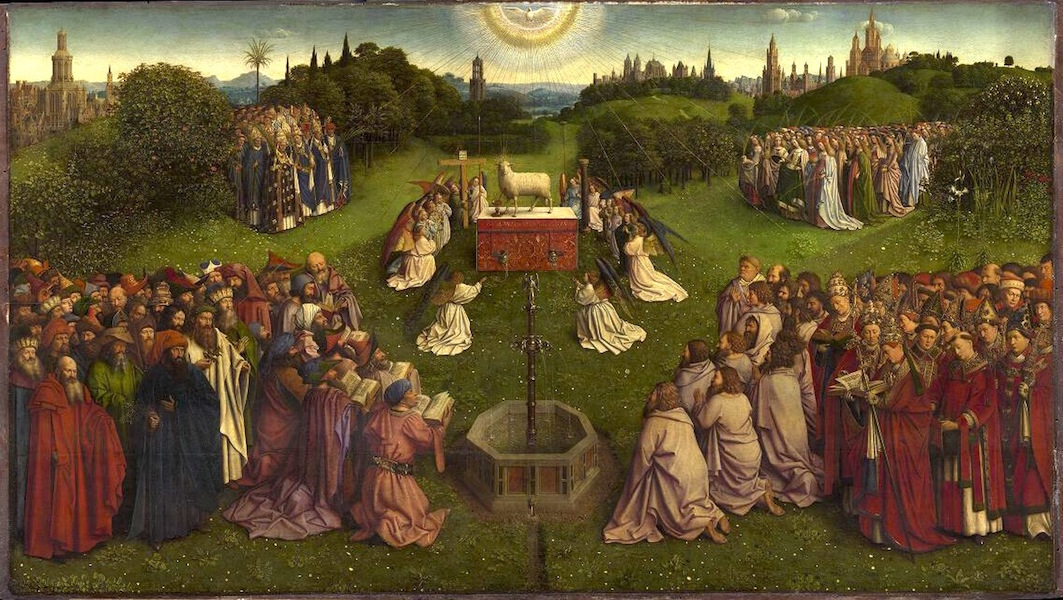Think of What is Above
Easter Sunday of the Resurrection of the Lord

On Easter Sunday, when the churches once more echo with Alleluias and the Resurrection of the Lord is joyfully proclaimed, after forty days of fasting we enjoy the feast. Indeed the Church offers us a whole week of feasting to celebrate the Resurrection. Each of the eight days in the Octave of Easter (Sunday to Sunday, inclusive) is celebrated as a Solemnity. We have official permission to party! It is truly right and just.
It is natural that we look forward to enjoying whatever we may haven given up as our Lenten sacrifice. If you haven’t had coffee or chocolate, Netflix or hot showers for six weeks, you are no doubt eager to indulge in these little pleasures once more. That is also right and just.
In addition to the natural looking forward to the feasting, I invite you to look back and reflect on the fasting. How did your Lent go? We don’t just do penance mindlessly, after all. We do it for a reason. To reflect on our observance of Lent requires us to be mindful of the purpose of all the little sacrifices we make.
Did you give up dessert because you wanted to lose a few pounds? Did you give up social media because you wanted to break some addictive habits? These are not bad reasons in themselves. But the Church doesn’t give us Lent as a self-help program. It’s a spiritual-help program.
There are many reasons why we do penance. It helps us to build discipline and grow in virtue. Voluntarily enduring little sacrifices prepares us to endure the bigger sacrifices we don’t choose for ourselves (but which invariably come). These are also not bad reasons. But they are not sufficient reasons. The first thing to know about spiritual-help is that it is not, by definition, self-help, because we cannot save ourselves. We need a Savior. So the first step in spiritual-help is to learn to rely on our Savior.
The Lenten penances of prayer, fasting and almsgiving are meant to help us detach from the things of this world and to “think of what is above” (as St. Paul instructs in Col 3:2). The point of our Lenten penance is to help us come closer to Christ, to die with Christ, so that our life becomes “hidden with Christ in God,” (Cor 3:3) so that, “when Christ your life appears, you too will appear with him in glory” (Cor 3:4).
So where is Christ? At the Incarnation, Christ came to Mary. He lived with her and Joseph for the “hidden years” of his life. Have you come to Mary and asked her to introduce you to her Son? At the start of his public ministry, Jesus was in the desert, fasting and praying. This is our model for Lent. Have you entered into the desert to pray and fast with him? As he ministered, Christ sought out the poor, the sick, and the sinners. Have you looked for him among those in need? Do you recognize yourself as someone who needs his mercy, and looked for him in your own heart?
On Holy Thursday, we are reminded that Christ is always present for us in the Eucharist. Do you receive Holy Communion mindful of this precious gift of his Presence? Do you take advantage of opportunities for Eucharistic Adoration? Do you seek him in the tabernacle?
On Good Friday, we find Christ on the Cross. When you encounter crosses in your life, do you recognize his presence there?
On Holy Saturday, we find Christ in the tomb. This is where it is most difficult to discern his presence: in darkness and silence, shrouded in death.
But then comes the new dawn of Easter morning and the glory of the Resurrection. The tomb is empty. Jesus is no longer to be found there, in the land of death and decay. He is in Galilee, having breakfast on the lake shore. He is with Peter, saying “feed my sheep.” He is on the road to Emmaus, in the breaking of the bread. He is on the Mount of Olives, ascending to heaven. He beckons us to ascend with him, to reign in the eternal kingdom of his Father.
This is the Good News at the heart of the Christian faith. The cross leads to resurrection. Without Easter Sunday, Good Friday is meaningless. So without Easter, Lent is meaningless. The little crosses we endure with our penance are meant to point to the joy of the resurrection. Otherwise they are meaningless. So with that in mind, I ask again, How did your Lent go? Did the sacrifices you made bring you closer to Jesus? If yes, praise God! If no, that’s fine, too. There will be other Lents. There will be other occasions for penance.
Every day is a new opportunity to draw near to Jesus in all the places he can be found. Every day is a new day to proclaim, “This is the day that the Lord has made. Let us rejoice and be glad” (Ps 118:24).

